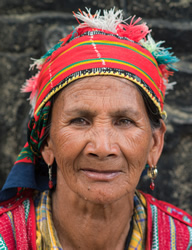Inibaloi, Nabaloi in Philippines

Photo Source:
Wayne S. Grazio - Flickr
Creative Commons
|
Send Joshua Project a map of this people group.
|
| People Name: | Inibaloi, Nabaloi |
| Country: | Philippines |
| 10/40 Window: | No |
| Population: | 213,000 |
| World Population: | 213,000 |
| Primary Language: | Ibaloi |
| Primary Religion: | Ethnic Religions |
| Christian Adherents: | 30.00 % |
| Evangelicals: | 7.00 % |
| Scripture: | Complete Bible |
| Ministry Resources: | Yes |
| Jesus Film: | Yes |
| Audio Recordings: | Yes |
| People Cluster: | Filipino, Tribal |
| Affinity Bloc: | Malay Peoples |
| Progress Level: |
|
Introduction / History
The Ibaloi people live in the southern part of the Cordillera, the huge mountain range in the northern Philippine island of Luzon. They have outlasted the conquering Spanish, Americans and Japanese who took timber and ore from their land often destroying farmlands in the process.
They grow rice using terraces that they and their ancestors have engineered on the steep mountain sides as well as vegetables, fruit and cut flowers. They have also expanded into businesses such as herding cattle and mining gold. The famous Baguio City is within their territory. This city brings summer visitors from all over the Philippines and from around the world to enjoy its cool climate and beautiful surroundings. Baguio City is a modern urban center called the "Summer Capital" of the Philippines. It is also a university town with nearly half the population being students from several universities located there. Many Ibaloi are highly educated in all major professions.
What Are Their Beliefs?
The Ibaloi community is already on the path to transformation. As traditional spirit worshippers, they sought the blessings of their ancestors, asking for healing, prosperity and long lives. Thanks to the introduction of Christianity in the 1950s, about 30 percent of the Ibaloi claim to be Christians. In more recent years, a team of translators produced the New Testament and the "JESUS" film. Being exposed to mother tongue Scripture has resulted in Christians showing love and grace to other people groups and cooperating in mission outreaches to them.
What Are Their Needs?
Now that preachers are using the Ibaloi New Testament as a basis for sermons, people are hungry for the whole Bible. Some say, "It is discouraging to bring the New Testament to church when the preacher uses an Old Testament portion for his text." So the Ibaloi themselves are well on the way to translating and making the full printed Bible available.